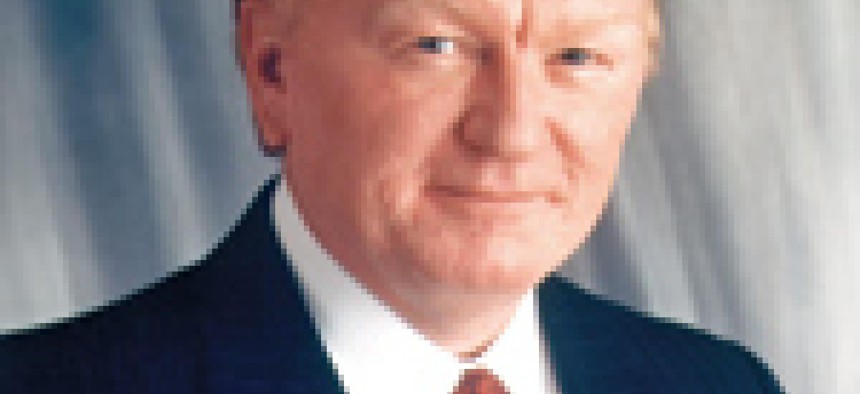ManTech's Pedersen assesses the market's present and future

George Pedersen, founder, chairman and CEO of ManTech International Inc., explains his strategy for keeping his company focused on the hot sectors of the government market.
George Pedersen, founder, chairman and CEO
of ManTech International Inc., recently won the
2011 Federal 100 Eagle award from Washington Technology’s sister publication Federal Computer Week.
He led the company through three mergers and acquisitions during the past year that expanded the company’s offerings in cybersecurity and command, control, communications, computers, intelligence, surveillance and reconnaissance. The company is expected to surpass $3 billion in revenue in 2011. He also is active with industry groups, including the National Defense Industrial Association and Association for Enterprise Information. He recently responded via e-mail messages to questions from Associate Editor David Hubler about trends in the government contracting market.
WT: As a longtime leader in the government market, what’s your vision of its near future, and are you optimistic or pessimistic?
George Pedersen: I remain optimistic both for ManTech and for the industry. For the industry as a whole, the government will need the private sector more than ever. It will still need to respond to contingencies and rely on civilian contractors to set up teams quickly to carry out important tasks. The armed forces need to have their personnel doing what only uniformed service members can do, and it makes a great deal of sense to ask business to do the other things — like technology development and enhancement, logistical support, technical support and maintenance.
WT: What are the main problems facing the industry in this era of tight federal budgets?
George Pedersen: The private sector offers the government exactly what it needs in an era of belt tightening: flexibility, agility, and value. The government needs to look at how to get the best value for the lowest cost, and that always opens opportunities for the private sector. It is important to note that contractors are more agile and can provide the appropriate response, including personnel, far faster than the government itself can. That is why they require contractors. The biggest challenge will be to accurately predict what services and technology the government will need from industry and to deliver them at a low cost and with the highest possible quality.
WT: How are new technologies, such as social networking and cloud computing, changing how ManTech works?
George Pedersen: Cloud computing presents great opportunities and challenges but mostly opportunities for ManTech. The cloud offers the possibility of substantial cost savings for many enterprises, including the government. But it also presents greater risks in protecting your data, since you may not know where it is at all times or what path your data takes as it travels through the cloud. Many of our existing capabilities, technologies and solutions apply to our overall cloud computing solution. The widespread use of social networking has been good for collaboration, but it has opened up new security and vulnerability issues. Rapidly spreading social engineering attacks have made even well-protected networks and applications vulnerable, and insider threats are growing as well.
WT: Your company has been quite active in the mergers and acquisitions arena. Do you expect to make any acquisitions in 2011, and if so, what sort of companies are you looking for?
George Pedersen: As you know, acquisitions have been an important part of our growth strategy since we went public in 2002. Indeed, even prior to going public, we completed our first acquisition in 1971. We judge potential acquisitions on four criteria: they must provide new capabilities, customers or technology; they must generate double-digit growth within their own business base; they must create significant cross-selling opportunities; and they must be accretive immediately. That is, they must contribute immediately to our bottom line. I won’t predict what we will do in 2011, but you can be sure that we will continue to look aggressively for acquisitions that make sense.
WT: What attracted you to companies such as TranTech and MTCSC, for example?
George Pedersen: Although TranTech had only $15 million in revenue, it expected double-digit growth. It also was an awardee on the Encore II contract, an IDIQ contract vehicle with a $12 billion ceiling issued by the Defense Information Systems Agency to provide IT solutions in support of all functional requirements throughout the federal government. That allows us to leverage our cyber and IT capabilities and opens up big possibilities for us. MTCSC had $85 million in revenue and also expected double-digit growth. It held a strong position in the C4ISR market and will allow us to cross-sell cyber solutions to the Marine Corps, which has not been a major customer in the past.
WT: Finally, what is the one particular concern that keeps you up at night?
George Pedersen: I worry about the people we have in areas of conflict — in Iraq, Afghanistan and other places where they could simply be in the wrong place at the wrong time. I dread getting a call in the middle of the night telling me that one or more of our employees has been killed or seriously injured. And I can tell you that if that happens, that employee’s family will discover that they have a much larger family at ManTech that will stand with them for as long as they need us.

